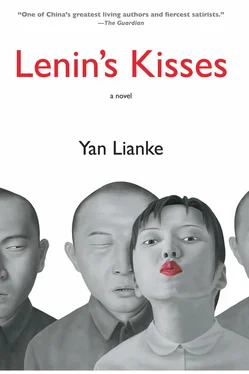Yan Lianke
Lenin's Kisses
“The time is out of ioynt: Oh cursed spight,
That ever I was borne to set it right.”
William Shakespeare, Hamlet
While still alive, Chairman Mao had insisted that he wished to be cremated after his death, but instead his corpse was embalmed and placed on display in a crystal coffin in Beijing’s Tiananmen Square. Despite persistent speculation that the corpse currently on display is actually a replica (reinforced by reports by his personal physician that the initial embalming process had been badly botched), the mausoleum remains enormously popular, frequently drawing lines of tourists that extend half a mile or more. Commemorating a man who is credited with founding modern China but is also tacitly blamed for many of its attendant disasters, the Mao Zedong Mausoleum is a curious hybrid — part historical relic, part religious shrine, and part tourist attraction. Emblematic of a broader proliferation of Maoist artifacts that are alternately treated as fetish, kitsch, and good luck charm — a contemporary phenomenon that Geremie Barmé calls “shades of Mao”—Mao’s embalmed corpse literally embodies some of the contradictions that mark the peculiar historical juncture at which China currently finds itself, as it shifts abruptly from communist austerity to what is euphemistically described as “socialism with Chinese characteristics.”
Taking its inspiration from this fascination with Mao’s corpse, Yan Lianke’s Lenin’s Kisses revolves around the corporeal remains of another communist forefather: Vladimir Lenin. After learning that Russia may no longer be able to afford to maintain Lenin’s corpse on display in Moscow’s Red Square, a local Chinese official by the name of Liu Yingque proposes to purchase it and install it in a special Memorial Hall that he will construct in his home county. By developing an extensive tourism industry around this communist relic, Liu hopes to bring his county unimaginable wealth. But first he must find a way to raise the vast sum of money needed to purchase the corpse from the Russians, and for this he turns to an isolated village located at the outer margins of his county. One of the distinctive aspects of this village is that most of its residents are disabled and have developed a variety of special skills to compensate for their physical limitations, and Liu therefore comes up with the idea of having the villagers perform their disabilities, reinventing themselves as spectacular commodities.
The village is said to date back to the Ming dynasty, when a couple of disabled peasants (and an old woman) unable to keep up during an obligatory large-scale relocation from one province to another were permitted to drop out of the procession and establish a home in the mountains. Word soon spread of this unique community in the mountains, and before long disabled peasants from all around came to join them. Throughout much of the village’s history, its residents enjoyed a bountiful existence in which all their basic needs were easily met. Until the 1950s, the villagers were so isolated that they — like the inhabitants in the remote utopian community in Tao Yuanming’s famous fifth-century fable “Peach Blossom Spring”—remained blithely unaware of the political changes unfolding in the rest of the country.
As a result of this isolation, the villagers speak a dialect of Chinese with many terms and phrases that would be unfamiliar to most outsiders. Some of these terms reflect actual usage in the region (Yan Lianke is from Henan), while others are the author’s own invention. In the novel, these terms are explained in a series of notes labeled “further reading.” For instance, the first note explains the verb shouhuo, translated here as “to liven”: this binome — which is borrowed for both the name of the village and for the original Chinese title of Yan’s novel itself — is composed of two Chinese characters that literally mean “to receive life,” but in the novel’s regional dialect are used to refer to enjoyment, pleasure, or even sexual intercourse.
At the same time, however, these notes do much more than simply explain obscure terminology. Like Nabokov, who once observed that “human life is but a series of footnotes to a vast obscure unfinished masterpiece” —and whose famous work Pale Fire is essentially a volume of footnotes — Yan Lianke uses the extensive notes in Lenin’s Kisses as crucial structural and conceptual elements of the work itself. These notes not only provide a convenient pretext for a series of flashbacks that help flesh out the histories of the protagonists and of the village itself, they also exemplify the peculiar temporal disjointedness that is a central concern of the novel as a whole.
As the text jumps back and forth between the narrative present and events from years, decades, and even centuries earlier, it generally uses the traditional Chinese calendar’s sixty-year “stem-and-branch” cycle, complemented at times with the corresponding animal from the twelve-year zodiac cycle. For readers who may be unfamiliar with the Chinese calendar, Gregorian dates have been added to the English translation (though it should be noted that few contemporary Chinese readers would know without consulting a chart that, for instance, the wuyin Year of the Tiger corresponds to 1998 and the first several weeks of 1999 in the Western calendar). Similarly, the novel also alternates between the modern metric system and traditional Chinese units for length, weight, area, and so forth. To preserve this distinction, we have retained the metric units while translating most traditional Chinese units into their English equivalents. For instance, a Chinese chi is approximately the same length as an English foot, so we simply call it a foot. For a few Chinese units that don’t have a close equivalent in the English system (for instance, a li is equivalent to about a third of a mile, and a mu is equivalent to 0.165 of an acre), we have retained the original Chinese terms.
Just as Lenin’s Kisses alternates between disparate chronological periods and measuring systems, it also delicately negotiates a compromise between social critique of political permissibility — like many of Yan’s other works. For instance, his novel Serve the People, in which the Maoist injunction to “serve the people” is twisted around to justify the pursuit of erotic bliss, was never officially released in Mainland China, while Dream of Ding Village, which focuses on China’s rural AIDS epidemic, was technically banned after its publication (though it remained widely available). Lenin’s Kisses, meanwhile, was not banned — and, in fact, it was awarded China’s prestigious Lao She Literary Award — though its unflattering portrayal of contemporary China did lead the People’s Liberation Army, which had employed Yan as an author since the 1980s, to ask him to step down. Yan Lianke is forthright about the restrictions that many contemporary Chinese authors continue to face, and notes that he himself often engages in a process of self-censorship, attempting to anticipate what the State censors will find objectionable in his own work. In a recent blog post, he compares these processes of censorship and self-censorship to an act of castration, asking rhetorically, “Is not a literature that can only dance within a tightly constrained space also a castrated literature? Can a castrated literature still be considered literature? And, if it is not literature, then what would it be?”
Despite his trenchant criticism of the “castrating” effects of the Chinese state’s censoring apparatus, Yan Lianke appears to delight in his ability to dance at the very margins of what is politically permissible. Just as the villagers of Liven learn a variety of “special skills” to compensate for their physical disabilities, Yan Lianke has developed an uncanny ability to use allusion and innuendo to dramatize the stark inequities of modern China. In
Читать дальше












